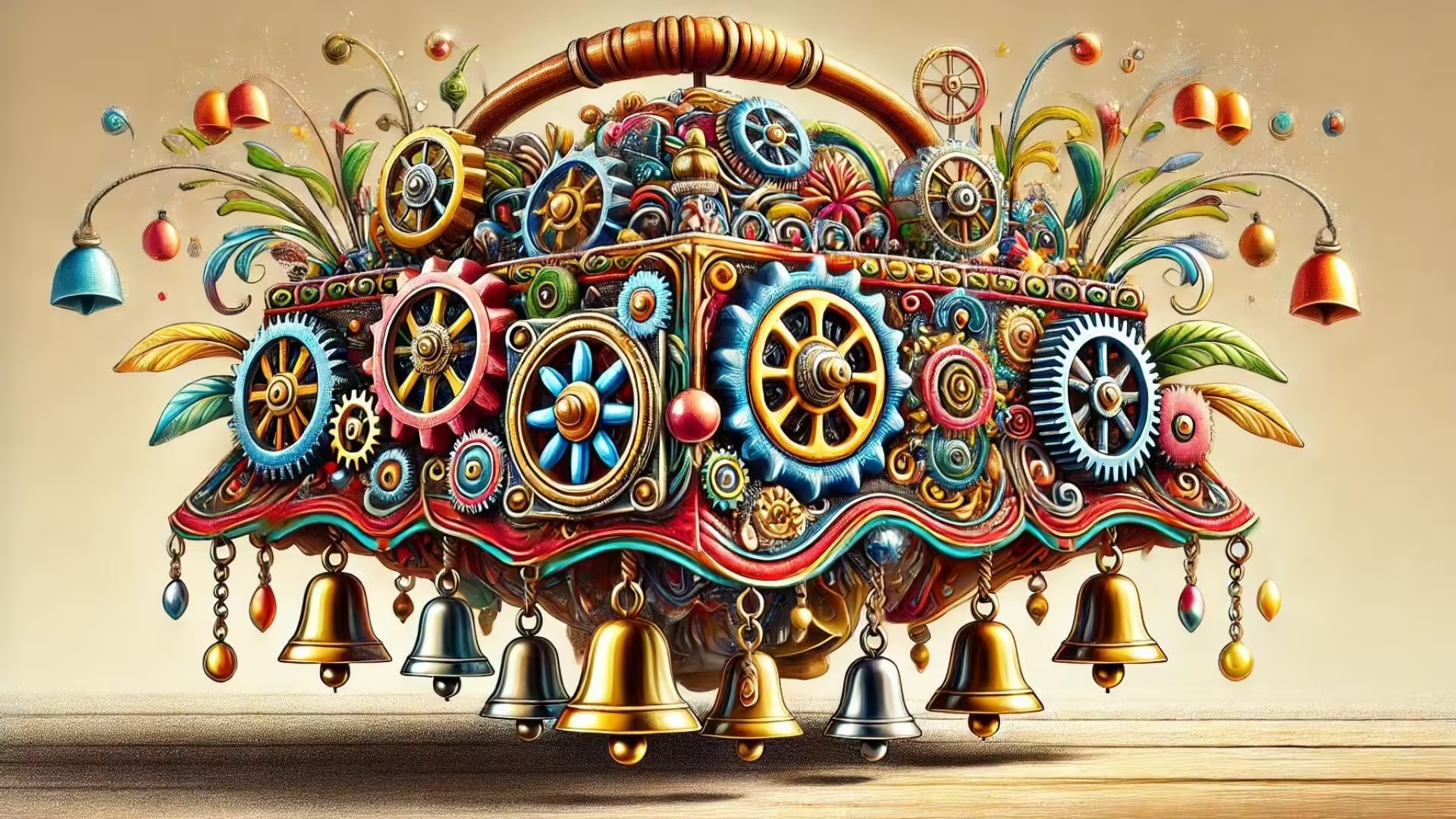Bells and Whistles: Meaning, Usage, and Examples
In the world of language, idioms often serve as colorful expressions that convey deeper meanings. One such idiom, “bells and whistles,” is commonly used in everyday conversations and business discussions. But what exactly does this phrase mean, and how can you use it appropriately? Let’s explore.
What Does “Bells and Whistles” Mean?
The idiom “bells and whistles” refers to extra, often unnecessary, features added to a product, service, or experience. These features are typically designed to make something more appealing or impressive, but they do not necessarily improve the core functionality.
For example, a car with automatic parking assistance, heated seats, or an integrated entertainment system may be described as having all the “bells and whistles.” These features are not essential to the primary function of driving but are added to enhance the user’s experience.
When It’s Appropriate to Use “Bells and Whistles”
You can use “bells and whistles” in contexts where you want to describe something that comes with additional, often luxurious or superfluous features. It’s often employed when comparing something basic to something more extravagant.
Example 1:
- “This basic smartphone is perfect for what I need, but if you want all the bells and whistles, you should check out the newest model with face recognition and a three-lens camera.”
In this case, the idiom highlights that the newer phone has additional features that are not strictly necessary but could be desirable for some users.
Example 2:
- “The hotel room we booked is nice and simple, but the suite upstairs has all the bells and whistles, like a Jacuzzi and a private balcony.”
Here, “bells and whistles” emphasizes the luxurious additions that differentiate the suite from a standard room.
When It’s Not Appropriate to Use “Bells and Whistles”
While “bells and whistles” is commonly used, it’s important to recognize when it may not fit the situation. You should avoid using this idiom in contexts where simplicity or essential functionality is the focus or when discussing something that doesn’t involve unnecessary features.
Example 1 (Inappropriate Use):
- “I bought a loaf of bread with all the bells and whistles.”
Bread, being a simple, staple item, doesn’t come with extras in the way technology or luxury goods do. Therefore, using the idiom in this context sounds confusing and misplaced.
Example 2 (Inappropriate Use):
- “The emergency evacuation plan is straightforward, without any bells and whistles.”
In a serious context like emergency preparedness, using the idiom could come across as dismissive or inappropriate, as it downplays the gravity of the situation.
Real-Life Examples of “Bells and Whistles”
The idiom is often heard in industries like technology, marketing, and consumer goods, where companies frequently advertise products with additional features.
- In technology: “The new laptop has all the bells and whistles, from a backlit keyboard to a high-resolution touch screen, but it’s not essential if you only need it for basic tasks.”
- In marketing: “Our basic subscription covers everything you need, but for all the bells and whistles, consider upgrading to the premium plan.”
In these examples, the idiom emphasizes added features that may not be necessary but could provide a more enhanced experience.
When to Use “Bells and Whistles”
The idiom “bells and whistles” is a useful phrase for describing things that come with optional extras or flashy, non-essential features. It’s ideal for informal conversations, marketing, and discussions where the distinction between the basic and the extravagant is important. However, it’s crucial to avoid using it in contexts that focus on essential, serious, or fundamental needs.
Next time you come across a product or service with extra frills, you’ll know when it’s appropriate to say it has “bells and whistles”—and when it’s better to opt for more straightforward language.
Now that you understand the idiom “bells and whistles,” think of examples in your daily life where this phrase applies. Can you spot the unnecessary extras in the products you use or the services you encounter?
Expand Your Vocabulary
- Bells and Whistles
Meaning: This idiom refers to additional features that are often unnecessary but can enhance the appeal or functionality of a product or service.
Context: “The new car model comes with all the bells and whistles, from heated seats to voice-activated controls.”
Everyday Use: You can use this phrase when talking about something that has extra, flashy features beyond what is essential. For example, when shopping for a phone, you might ask, “Do I really need all the bells and whistles, or should I go for a simpler option?” - Extravagant
Meaning: Describes something that is more elaborate or expensive than necessary.
Context: “The suite upstairs has all the extravagant extras, like a private pool and a personal butler.”
Everyday Use: Use “extravagant” to describe something luxurious or over-the-top, often implying that it might be more than you need. For instance, “Her wedding was beautiful but a bit extravagant with the fireworks display.” - Superfluous
Meaning: Unnecessary or more than what is needed.
Context: “The superfluous features on the new laptop might look impressive, but they don’t improve its performance.”
Everyday Use: You might use “superfluous” when talking about something that adds no real value, such as “All those extra decorations on the cake felt superfluous.” - Core Functionality
Meaning: The essential, most important features of a product or service.
Context: “Despite all the bells and whistles, the phone’s core functionality is what matters most.”
Everyday Use: When focusing on the main purpose of something, you can say, “Let’s not get distracted by the extras; what’s the core functionality of this app?” - Added Features
Meaning: Additional components that are not part of the basic or original version.
Context: “This car has some cool added features like parking assistance and automatic braking.”
Everyday Use: You can use “added features” when discussing something that has been enhanced or improved, such as “The added features on this smartwatch make it much more useful for fitness tracking.” - Appeal
Meaning: The attraction or charm that something has for people.
Context: “The extra bells and whistles might appeal to tech enthusiasts, but not to those who prefer simplicity.”
Everyday Use: “Appeal” is commonly used to describe what makes something attractive. For example, “The appeal of this restaurant is its cozy atmosphere and delicious food.” - Simple
Meaning: Basic, not complicated, or without unnecessary additions.
Context: “The hotel room we booked is simple, without all the bells and whistles of the deluxe suite.”
Everyday Use: “Simple” is often used when describing something easy to understand or use. For example, “I like this design because it’s simple and elegant.” - Luxury
Meaning: Something that is expensive and not essential but provides pleasure and comfort.
Context: “The luxury suite comes with all the bells and whistles you could ask for.”
Everyday Use: You might use “luxury” when talking about something that adds comfort or pleasure but isn’t necessary. For instance, “Having a personal driver is definitely a luxury.” - Frills
Meaning: Extra, often unnecessary, features added to something.
Context: “I don’t need all the frills, just give me a basic, reliable computer.”
Everyday Use: “Frills” is typically used when you want something simple without extras. For example, “I like this coffee shop because they focus on good coffee without the frills.” - Unnecessary
Meaning: Not needed or more than what is required.
Context: “The automatic parking feature is cool, but it feels unnecessary for such a small car.”
Everyday Use: “Unnecessary” is a common word used when describing something that isn’t required. For example, “Buying a new phone right now seems unnecessary since my current one works just fine.”
Let’s Talk
Now that you’ve learned about the idiom “bells and whistles” and explored its meaning, think about how it applies to everyday life. Here are a few questions to reflect on and discuss:
- In what situations do you think added features (bells and whistles) improve your experience? Can you think of examples where these extras were unnecessary or even distracting?
- Do you prefer simplicity in products and services, or do you appreciate having all the bells and whistles? How does this preference affect your choices in technology, travel, or even lifestyle?
- Can you recall a time when you purchased something for its bells and whistles, only to find out that you didn’t use the extra features as much as you thought you would? What did you learn from that experience?
- How do you think the presence of unnecessary extras impacts the cost of products? Do you believe it’s worth paying more for these added features, or do you find it better to stick to basics?
- When it comes to luxury and extravagance, where do you draw the line between necessity and excess? How do you think society’s perception of what is ‘necessary’ has changed over time?
Feel free to share your thoughts in the comments or discuss these questions with friends and family. It’s a great way to deepen your understanding of the concept and apply it to your personal experiences!











0 Comments